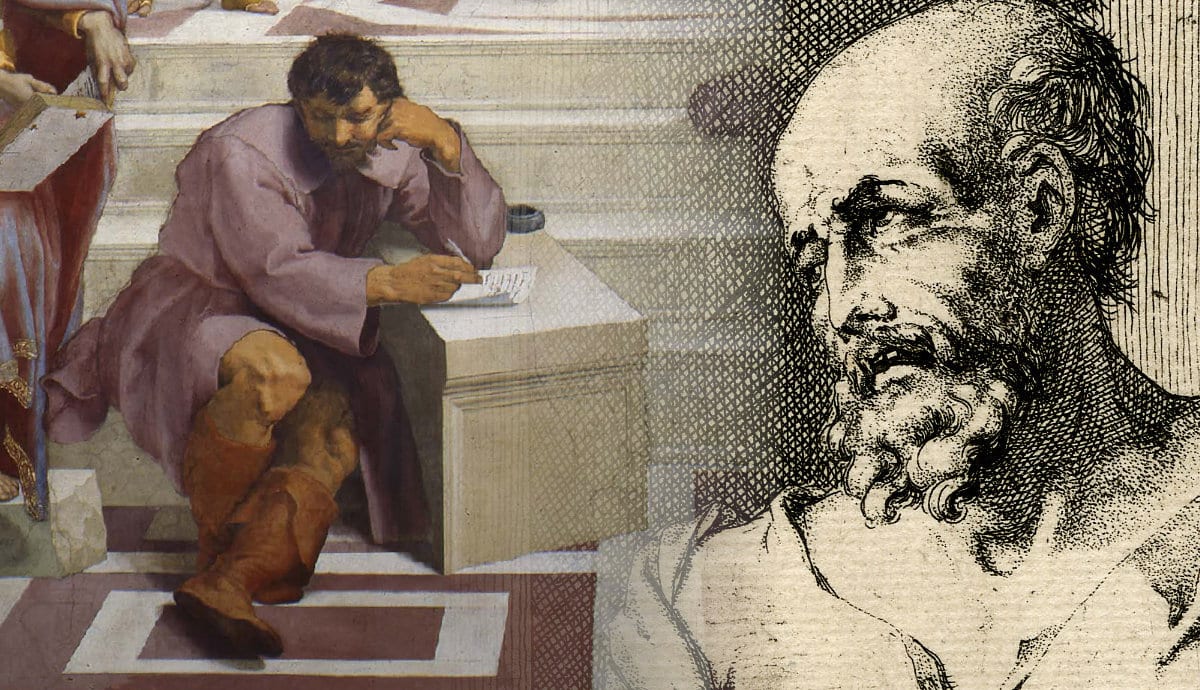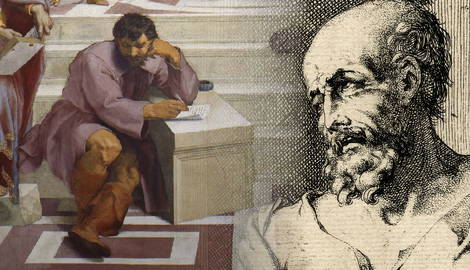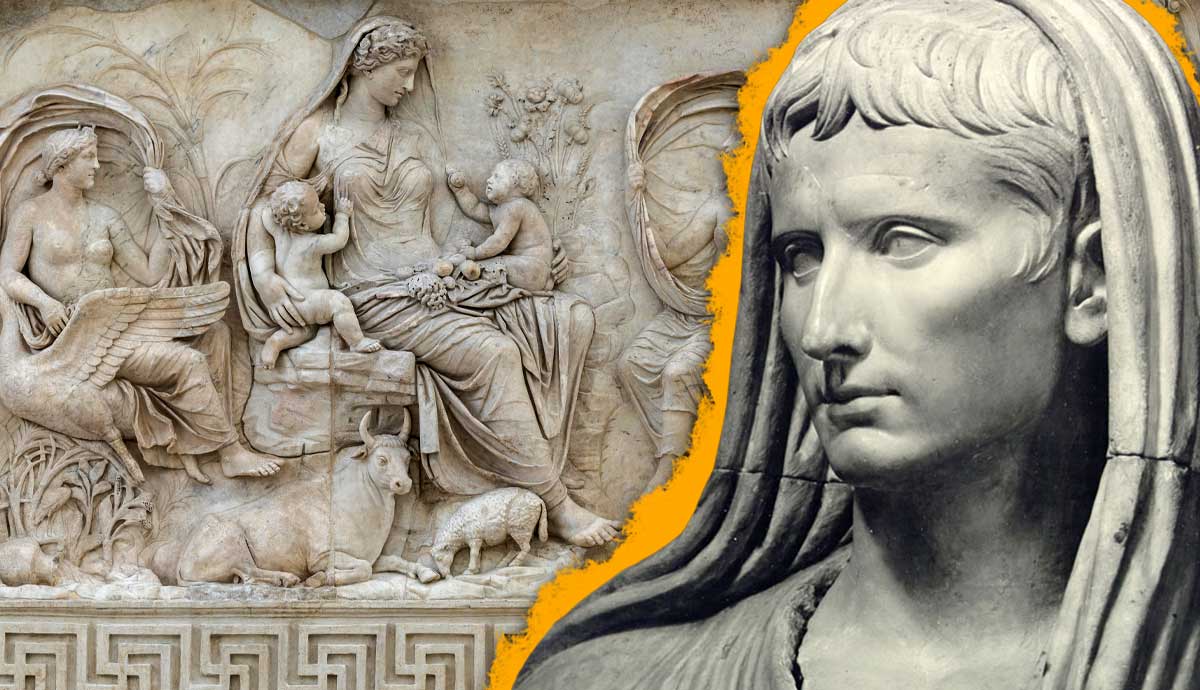
Heraclitus was a Greek philosopher who lived in Ephesus of Asia Minor (present-day Turkey) in the 6th century BCE. He is one of the most popular presocratics, ie, the Greek philosophers that preceded Socrates. His thought has influenced thinkers as diverse as Plato, Aristotle, the Stoics, Schopenhauer, Nietzsche, Hegel, Marx, Heidegger, Jung, Kafka, Lenin and so many more. His work survives in small fragments of cryptic and often paradoxical nature. As a result, he is often known as the ‘Obscure,’ the ‘Riddler’ or the ‘Dark One.’ His quotes remain popular not only among students of ancient philosophy but also among the wider public, with the most famous being his aphorism that “no one ever steps in the same river twice”.
Heraclitean philosophy taught that everything was in flux, constantly changing. Heraclitus also spoke of fire as the primary natural element, put forth the influential concept of the unity of opposites, and was the first philosopher in Greece to use the term ‘Logos’ to describe the cosmic order. In this article, we will explore the life and work of Heraclitus through his most famous quotes.
The Life Of Heraclitus

Heraclitus was born in Ephesus, a wealthy Greek Ionian city in Asia Minor (present-day Turkey) around 535 BCE. He descended from an aristocratic family but, according to ancient stories, he was not interested in politics. In fact, he is said to have rejected the (honorary) title of Ephesus’ king in favor of his brother.
Although it remains unknown exactly what were the duties of a king in Ephesus at the time, Heraclitus’ rejection clearly showed that he was not willing to participate in the political life of the city. As a result, Heraclitus signals a departure from previous thinkers such as the Seven Sages of Ancient Greece who were more of politicians and lawgivers than philosophers, by modern standards. From then on, philosophers would not necessarily seek to play an active role in the political life of their city. Instead, many would claim to serve a higher purpose.
Heraclitus perfectly embodied this disdain for public matters. Diogenes Laerius, the main source on the Greek philosopher’s life, wrote that Heraclitus preferred to play knucklebones in the temple of Artemis (one of the seven wonders of the ancient world, not to be confused with Artemis’ temple in Corfu) rather than partake in politics. Later on, when the Ephesians recognized his wisdom, they asked him to make laws for the city; a common practice at the time for philosophers. However, Heraclitus denied and chose to live a monastic life.
His Unusual Death

According to Diogenes Laertius, who lived more than three century after Heraclitus, the Greek philosopher died of dropsy (edema) around 475 BCE. His death was, let’s say, unique. The story is the following. Heraclitus had gotten used to the monastic life. After spending years talking in riddles and paradoxes, he had become unable to communicate simply with other people. When he got symptoms of dropsy, he visited the doctors of the city and asked them if they could make a drought after a storm. No doctor could understand what he meant and Heraclitus left unassisted. As the symptoms got worse, he decided to take the situation into his hands.
“He buried himself in a cowshed, expecting that the noxious damp humour would be drawn out of him by the warmth of the manure. But, as even this was of no avail, he died at the age of sixty.” Diogenes Laertius, IX.1.3
Diogenes also relates that:
“…being unable to tear off the dung, he remained as he was and, being unrecognizable when so transformed, he was devoured by dogs.” Diogenes Laertius, IX.1.4
Before we cry or laugh at the misfortunes of Heraclitus, we should keep in mind that this story is most probably a myth created by Diogenes Laertius. In the story, Heraclitus’s quotes and enigmas turn against him causing his death. Making up death stories for Greek philosophers, was an especially popular practice during the Hellenistic period.
The ‘Obscure’ Greek Philosopher

Heraclitus is said to have written only one work called On Nature and dedicated the only copy to his beloved temple of Artemis. This means that either he intended his work to be read in the mystifying atmosphere of the temple. According to the ancient tragic poet Scythinus, the reader of the book should not:
“…be in too great a hurry to get to the end of Heraclitus the Ephesian’s book: the path is hard to travel. Gloom is there and darkness devoid of light. But if an initiate be your guide, the path shines brighter than sunlight.” as quoted in Diogenes Laertius, IX.1.16.
But why did Scythinus compare Heraclitus’ work to a hard-to-travel, gloomy, dark path? Heraclitus was a huge admirer of the oracle of Delphi and her enigmatic sayings. He loved paradoxes, enigmas, and compressing complex meanings into brief sentences. As a result, it was very difficult for anyone to decipher the meaning hidden behind his puzzles. Still, Scythinus believed that the Greek philosopher was challenging but worth exploring nonetheless as, in the end, the properly initiated will discover the path that “shines brighter than sunlight.”
Today Heraclitus’ work is permanently lost. The only way to know the Greek philosopher is through fragments of his work quoted by other ancient authors, like Plato, Aristotle, Diogenes Laertius, the Stoic philosophers, and early Christian thinkers.
What Did Socrates Think About Heraclitus?

Socrates held a similar view to Scythinus. According to a legend, when Euripides, the tragic playwright, asked Socrates what he thought of Heraclitus’ book, Socrates replied that what he understood was excellent, and so were the parts that he didn’t! Socrates, one of the most famous philosophers in history, found Heraclitus challenging and he had access to the original text and was also able to read it in its original language. So it is no wonder that by the Middle Ages, people would find the Ephesian almost incomprehensible. This also explains how Heraclitus was called nicknames like ‘Obscure,’ ‘Dark,’ and ‘Riddler.’
The Weeping Philosopher

Heraclitus became known in the centuries after his death as the ‘weeping philosopher’. Why? As the ancient sources recorded, he spent many years alone, away from society. Also, he is attributed with a series of pessimistic (or rather elitist) statements in which he complained that the majority of people are unable to comprehend the Logos (cosmic reason).
The ‘weeping philosopher’ became a commonplace title in the art of the subsequent centuries and Heraclitus often appeared crying next to a laughing Democritus, who was named the ‘laughing philosopher’ as his philosophy appeared more cheerful to later scholars. The most famous depiction of Heraclitus as a weeping philosopher is in Raphael’s famous painting The Academy of Athens, where Raphael painted Michelangelo as Heraclitus sitting alone in the foreground of the image.
Fire: A Key Concept in Heraclitus’ Philosophy

During Heraclitus’ time, Greek philosophers were trying to understand the universe, its true nature, and its underlying laws. Especially Greek philosophers from the cities of Ionia were interested in uncovering what things are made of. These thinkers are also called monists (monism=oneness) because they claimed that everything in existence was made of a single element. First came Thales (c. 620-546 BCE) and said that everything was water. Then, Anaximenes (6th century BCE) stated that it was air. Anaximander (c. 610-546 BCE) proposed that an abstract substance called Apeiron (the infinite) was the basis of all things.
Heraclitus took a stance on the matter. For him, the original and most basic element of all was fire.
“This world, which is the same for all, no one of gods or men has made; but it was ever, is now, and ever shall be an ever-living Fire, with measures of it kindling, and measures going out.” Die Fragmente der Vorsokratiker by Diels and Kranz (DK), 30
However, there is a difference between Heraclitus and the other monists. He seems to have used fire in a more abstract way than Thales had used water for example. Looking closer into his passages about fire, it seems that Heracletean fire was something closer to energy, as can be deduced from the passage where he calls fire the measure for all things changing:
“All things are an interchange for Fire, and Fire for all things, just like goods for gold and gold for goods.” DK, 90
It can be also argued that he used fire as a vivid metaphor for change, which he understood to be the real basis of the universe. Just think of fire for a bit. It never stays the same, it never stays calm, it is always in movement. Heraclitus believed that this is the nature of everything. Everything constantly changes and takes the form of other things. The death of one thing is the birth of the other. In an endless circle, fire becomes air, air becomes water, and water becomes earth:
“Fire lives the death of air, and air lives the death of fire; water lives the death of earth, earth that of water.” DK, 76
Everything Flows (Panta Rhei)

Heraclitus’ most famous quote is without a doubt “Panta Rhei”, which roughly translates to “everything flows.” Or is it? Interestingly, Heraclitus never used these words himself. Still, “Panta Rhei” perfectly encapsulates his theory of constant change, i.e., the idea that the only constant in the universe is change. In his thought system, nothing is. Things are always becoming. The cosmos is not static, but flowing. A seed grows into a tree, a tree is felled to become a house, and eventually decays to nourish other organisms. The universe for Heraclitus is, therefore, a process. This continuous movement of things is expressed with the river quotes, with which the Greek philosopher compares the flow of the world to that of the current of a river:
“You cannot step twice into the same rivers; for fresh waters are ever flowing in upon you.” DK, 12
And:
“We step and do not step into the same rivers; we are and are not.” DK, 49a
No one and nothing escapes Heraclitus’ cosmic river. Not only does the river always change, but also the subject. Every moment that passes finds a new world and a new ‘us’.
The Unity of Opposites & the Birth of Dialectics

This idea of a world that is always moving and changing set the basis for what philosophers later called the dialectic, a method of philosophical inquiry whereby one finds a solution to a problem by examining two contradicting theses. So, why is Heraclitus the father of dialectics? Heraclitus believed that things tend to turn into their opposites given enough time. Life becomes death, day becomes night, and vice versa. So if the night is going to turn into day how can we claim that they are opposites? In the grand scheme of things, day and night, just like all the other opposites, are more like the two sides of the same coin, just like yin and yang in Taoism. This idea is known as the unity of opposites. Let’s take a look at some quotes by Heraclitus on the matter:
“The way up and the way down is one and the same.” DK, 60
“And it is the same thing in us that is quick and dead, awake and asleep, young and old; the former are shifted and become the latter, and the latter in turn are shifted and become the former.” DK, 88
The same applies to even mortals and immortals (heroes and gods):
“Mortals are immortals and immortals are mortals, the one living the others’ death and dying the others’ life.” DK, 62
Strife and War

But what truly makes Heraclitus the father of dialectics is his argument that harmony stems from the tension between opposite forces:
“there would be no harmony without high and low notes, and no animals without male and female, which are opposites.” Aristotle Eudemian Ethics 7.1235a
“Men do not know how what is at variance agrees with itself. It is an attunement of opposite tensions, like that of the bow and the lyre.” DK, 51
The opposites are in constant strife with each other but also co-depend. Without the one, the other cannot be:
“It is sickness that makes health pleasant; evil, good; hunger, plenty; weariness, rest.” DK, 110-1
In the Heraclitean universe, change does not occur on its own. There is a force that drives things forward, and that is strife. This is so important for Heraclitus, that he even rebukes Homer for wishing strife to disappear from the world! The Ephesian philosopher sees the strife between the opposites as essential, since the identity of one thing, depends on its strife with its opposite. This is so important that Heraclitus went as far as to even claim that:
“War is the father of all and the king of all; and some he has made gods and some men, some bond and some free.” DK, 53
Some scholars perceive this quote to be an endorsement of war. They argue that Heraclitus lived in an age of war and adopted a cynical stance that idealized conflict as the father of new empires and cultures. Others take this quote as a metaphor for the war between opposite forces in general.
Logos

Logos is a term with multiple different meanings in Greek, including speech, argument, reason, proportion, discourse, etc. For Heraclitus, Logos was the cosmic law, the law that determines the way things take place. Heraclitus was the first in a great line of Greek philosophers to use Logos as a central part of his system, in a way that favored abstraction, which is the reason why some later thinkers claimed that Heraclitus was the father of metaphysics. Logos was later used by Plato, Aristotle, the Stoics, the Neo-Platonists, and many more. Early Christian authors also loved using the Logos as a name for God.
The Relativism of Heraclitus
As Heraclitus believes in the unity of opposites and the oneness of everything, he also reaches a point of relativism. Contrary to other Greek philosophers, Heraclitus claims that things depend on our point of view.
“The wisest man is an ape compared to God, just as the most beautiful ape is ugly compared to man.” DK, 82-3
“The sea is the purest and the impurest water. Fish can drink it, and it is good for them; to men it is undrinkable and destructive.” DK, 61










